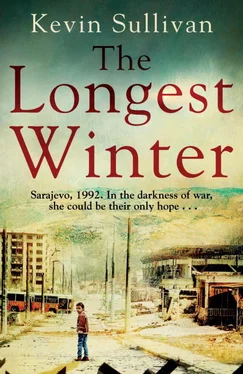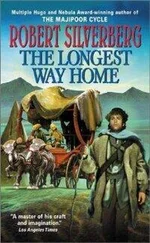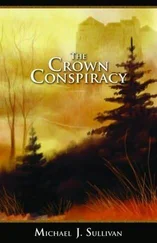‘A friend of a friend,’ Alija said.
He walked out of the office and into a long corridor that smelled of disinfectant and frost. The stairs to the ground floor were very broad and it was difficult to see because the stairway was dark. The policeman at the door nodded. Alija stepped outside. He felt his shoes grind fresh, crisp snow.
In those moments, walking down the broad stairs and out into the freezing gloom, Alija began for the first time to think kindly of Milena Ristić.
‘You gave her my note?’ Jusuf asked.
Alija looked as though he was about to say something difficult.
This morning was already difficult. More than a thousand villagers were on the move, with an inadequate escort over open country. Half of them hadn’t got across the river yet.
Before Alija could reply, they were interrupted. When anyone entered or left the command centre there was an upsurge of small-arms fire. The attackers now had a direct sight line from two blocks away.
Zlatko and Terry came in.
‘I’ll handle it,’ Alija told Jusuf.
He patted Zlatko on the arm and said, quietly and earnestly, ‘We haven’t any more time! Let’s do this now!’
Terry was reassured by Alija’s calm, methodical manner. He nodded to her, rather formally, and walked to the door.
‘I need you two!’ he called through the doorway. Moments later two soldiers hurried in, neither of them the one who had escorted Terry, Zlatko and Anna the day before.
The soldiers were in their early twenties. They wore combat jackets, blue jeans and trainers. One had a helmet. They both carried rifles.
‘This is Dr Barnes,’ Alija said in his strange emotionless voice as a mortar shell exploded outside in the street. Terry looked at Jusuf, who was standing at the other side of the room examining a map laid out on the table. He started speaking into a walkie-talkie. ‘She’s going to take Miro Pejanović to London,’ Alija went on, over the noise of wood breaking and masonry falling. ‘Go with her to the shelter and bring Miro back here.’
The soldier with the helmet poked his head out of the door. He was thin, gangling, with a pointed, unshaven face and bags under his eyes. When he moved, he moved quickly, leaping into the open.
He reached the other side of the street. They could hear the sound of his trainers scuffing across the frozen snow in the silence that followed the mortar explosion. Then there was a burst of gunfire. Further along the street bits of building material were coming unstuck, making cracking sounds as they sheared off and fell to the ground. In the distance there was a constant small-arms tattoo. The soldier waved frantically, signalling to the others to come out.
Terry experienced a sudden fear that was like the last overwhelming sensation of panic she remembered from diving into a swimming pool as a child. She knew that she must act without hesitation. To hesitate would be to allow panic to take over.
Another sensation was working in her brain. She was uneasy because of the attitude of the soldiers. The day before, the garage next to the command centre was full of men shouting and swearing and waiting for orders. Now it was nearly empty, and those soldiers who remained were silent. She could see that the two men Alija had ordered to escort them were scared.
Zlatko was different too. He was surprised by the state of the village. He was surprised that the government troops and the civilians had moved out so quickly. The village was ghostly.
Terry began to run. She expected another burst of fire but there wasn’t any. She heard her own steps on the ice. She heard Zlatko and the other soldier running behind her and didn’t look round. The soldier in front got up and began to run along the side of the building. She followed.
She looked down at the ground as she ran. The snow was harder than the day before. It was easier to see where to run but the surface was slippery. She jumped awkwardly over a long coiled piece of rusting steel and lost her balance on the other side. She slapped her left hand against the wall of the building and steadied herself. The soldier was moving fast and Terry ran hard to keep up.
Terry remembered intensive gunfire from when they had run towards the arcade the day before. Now it was quiet. There was no one in sight. She kept her eyes fixed on the soldier in front. He made it into the arcade and she thought he would stop there and allow the rest to catch up but he didn’t. He kept running. She lost sight of him when he moved out of the other side. For a few seconds she was alone. Those behind hadn’t caught up.
There were sharp shards of thick plate glass in the shopfronts. A door lay flat on the ground at one of the entrances, blasted off its hinges. She saw a calendar advertising oranges.
Cold air rushed towards her and she was out of the arcade again and running after the lead soldier twenty yards ahead. There was an evil silence.
The soldier waited at the entrance to the shelter as the other two caught up. Zlatko led the rest of the group along the corridor and down the stairs.
When Mrs Pejanović saw them she gave a small cry and put a hand to her mouth.
She had given up expecting them to come.
She didn’t want Miro to see that she was scared, but he could tell that she was and she knew he was going to start crying.
She and Miro had been alone for hours. Mrs Pejanović had reached the conclusion that she’d been wrong to put her faith in the British doctor. She knew, though, that they couldn’t have taken Miro over the river into the city. He was too weak. The last men to leave had helped her to move the cot across the shelter next to the stairs. She thought they were going to force her to bring Miro and leave with them. They said it was madness to stay.
Beside Mrs Pejanović was a large plastic suitcase tied with string. Terry saw the suitcase; she saw how different Mrs Pejanović was now, standing with her little boy and her luggage tied with string. She was a clever woman, and in other circumstances she would have exuded authority. Terry had been struck by her self-confidence. But now Mrs Pejanović was trembling. The change was startling. The last vestiges of Mrs Pejanović’s world had collapsed; the only residue of life in the cellar was a miasma of fear, of desperation. Terry touched the woman’s arm as she walked past. Silently and certainly she imparted a fragment of new hope.
Terry understood why she was there. She felt as though a great weight had been lifted from her. She was where she was supposed to be and she was doing what she was supposed to do.
She looked down at Miro and smiled. ‘ Dobro !’ She reached into the cot and the little boy held her hand very tightly. He was crying.
He was dressed for the journey, a T-shirt, a shirt, a sweater and cotton tracksuit trousers. Terry examined him and took his temperature. She moved with methodical speed.
‘We’ve got to go now,’ Zlatko told her. They heard shouting in the street above them.
‘They’re coming!’ Mrs Pejanović said.
Terry opened her bag and extracted a syringe.
Zlatko walked towards the stairs and then back again, three or four paces. He opened his mouth to speak, but said nothing.
Terry filled the syringe from a small vial and bent over Miro. The others watched. She administered the injection, slowly and carefully, whispering very gently, ‘ Dobro, dobro .’
Then she stood back and told the others, ‘OK, let’s go.’
The soldiers lifted the cot.
Mrs Pejanović struggled with the suitcase, but it was clearly much too heavy for her so Zlatko took it.
When he lifted it, the material on either side of the handle stretched and he thought it would come off. He raised the case onto his knee and then heaved it onto his shoulder. That way he carried it up the stairs.
Читать дальше












